The best horror movies of the 2010s
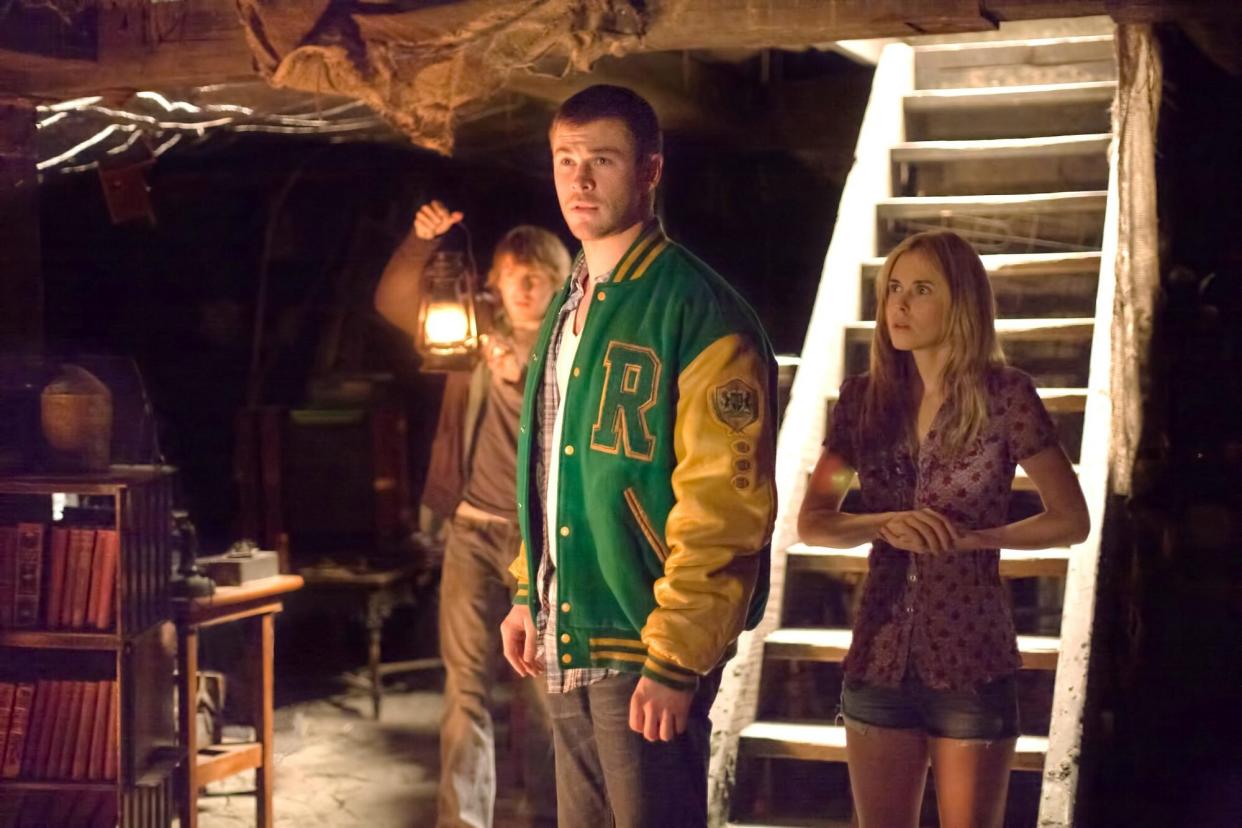
- Oops!Something went wrong.Please try again later.
- Oops!Something went wrong.Please try again later.
- Oops!Something went wrong.Please try again later.
- Oops!Something went wrong.Please try again later.
There's an odd comfort to be found in the genre flicks of yesteryear, what with their practical gross-out effects and familiar slashers. We love knowing when the knife will drop and crave the anticipation of a crowded theater's frenzied reaction. The danger of nostalgia, though, is that you can miss out on the new innovators, the filmmakers who grew up with the same movies we all did and sought to make something even better. Below, we've chronicled our picks for the best horror movies of the 2010s, a list that includes freakout dramas, queasy arthouse meditations, meta comedies, and social thrillers. Here are the future classics, the must-see horror films of the modern age.
<i>The Cabin in the Woods</i> (2012)
The Cabin in the Woods, one of the most subversive horror movies of the 2010s, was actually made in 2009. As director Drew Goddard told EW upon its 2012 release, the film's release was delayed by more than two years due to the bankruptcy of its original studio, MGM. The waiting game is no fun, but there was one silver lining: During the gap between production and release, Cabin star Chris Hemsworth picked up Marvel's Mjölnir and became one of Hollywood's biggest stars. That gave Goddard's oddball horror-comedy, co-written with Joss Whedon, a boost when it finally entered into a genre landscape overrun with insipid sequels and grisly purveyors of sepia-toned torture.
There's an argument to be made that Cabin in the Woods' winks at the genre it's simultaneously exploiting and satirizing serve to defang the horror — you can read that argument in EW's review — which is probably why its latter half leans so hard on the ingenuity of its creature design. It's also got one hell of a twist, though Goddard made a point to EW that the twist itself isn't as important as the "escalation." Let's put it this way: It's not too often your run-of-the-mill slasher evolves into something Lovecraft could perhaps not have dreamt up.

The Conjuring (2013)
The late, prolific paranormal investigators Ed and Lorraine Warren were most assuredly frauds, turning whispers of "hauntings" into grand spectacles via manipulation and exploitation. Still, that doesn't negate the impact their ploys and showmanship had on the aesthetics of modern horror. They knew how to tell a scary story — such as their 1971 investigation of the Perron farmhouse, where a family was purportedly terrorized by the spirit of a vengeful witch. This story became the basis for James Wan's franchise-starting The Conjuring, which stars Patrick Wilson and Vera Farmiga as the married ghost hunters, and this initial film is arguably the best one.
Though the series features the occasional dud (Annabelle, ugh), Wan's first entry is deeply creepy, layering itself in shadows before ushering its spirits to the forefront without the deafening musical stings of its sequels. Its most famous scare, which involves a pair of pale clapping hands, left EW critic Chris Nashawaty a "sweating, squirming wreck." Is there any better endorsement?

<i>Creep</i> (2014)
In an interview with EW, indie auteur Mark Duplass described his found footage flick Creep (not to be confused with the 2004 Franka Potente-starring film) as an "arthouse film about feelings that happens to just take a darker turn." That's one way to interpret this two-handed, low-budget tour de force about a meek videographer Aaron (played by director Patrick Brice) who's hired by Craigslist oddball Josef (Duplass) to make a video for his unborn son before he dies from a brain tumor. Creep won't scare everybody with its long, disorienting dialogues, but "Peachfuzz" might do the trick (if you know, you know). To those who have ever been stuck with an intense stranger who won't stop spilling their deepest, darkest secrets… well, good luck sleeping.
Creep was born primarily from a five-page outline and about a week's worth of improvisation between Brice and Duplass. This approach benefits the film's themes of forced intimacy with expert ease despite being a (wildly successful) passion project. It's about being yanked — unwittingly — into a stranger's emotional orbit, only to realize that you are far too close for comfort. "Why do we inherently trust people that we shouldn't trust?" Duplass posed to EW. "For fear of being rude, or offending people, we don't protect ourselves." Take it from us — you don't need to be everybody's friend.
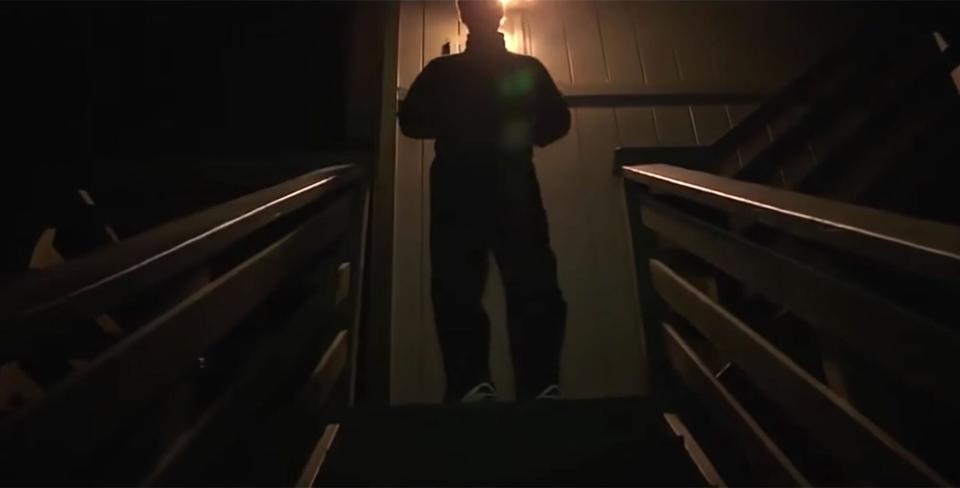
<i>Get Out</i> (2017)
Scary, funny, and sharp as a scalpel, Jordan Peele's feature directorial debut is a "social thriller" that shines light on a form of racism Hollywood doesn't like to talk about: the subtle, fetishistic kindness of upper-crust White liberals. Daniel Kaluuya stars as Chris, a Black man who ventures into the lily-white suburbs to meet the family of his girlfriend, Rose (Allison Williams). Despite her parents (Bradley Whitford and Catherine Keener) welcoming him almost too enthusiastically, Chris can't help but feel like something is off, especially once Rose's leering brother (Caleb Landry Jones) brings up racial genetics. Get Out is plenty disturbing, but, as EW critic Chris Nashawaty notes in his review, its "biggest jolts have nothing to do with blood or bodies, but rather with big ideas."
"[Get Out] was always about filling this void in the conversation," Jordan Peele told EW back in 2017. "I felt like the way we talk about race was and still is broken, but if this movie could help generate constructive discussion that involved new ideas, that would be the coolest thing." There's no denying that Black filmmakers didn't have as much of a voice in studio genre spaces before Get Out. But in the wake of the film's seismic success, which included a Best Screenplay Oscar for Peele (the first ever won by a Black person in that category), that's beginning to change.
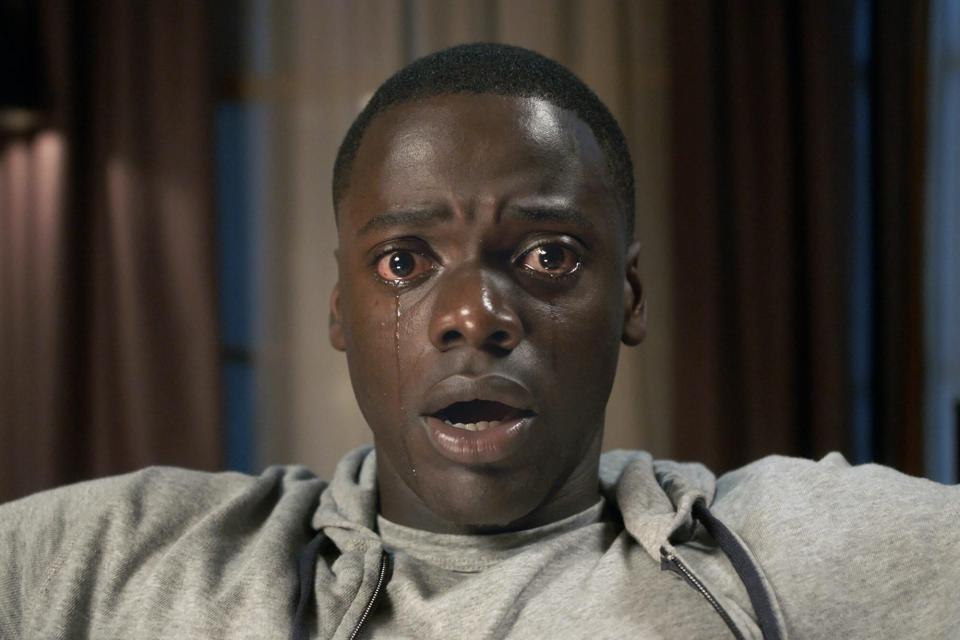
<i>Hereditary</i> (2018)
The first feature film from now-A24 darling Ari Aster, Hereditary is all about the horrors hiding in your bloodstream. We can't control the families we were born into, and Aster's soul-rattling drama drips with the dread of the inescapable. Toni Collette delivers a performance that's "raw, almost feral" as Annie, a woman who, after her mother dies, endures the collapse of both her family and her own mind. It's scary even before people start whispering about ancient demons.
"Hereditary doesn't reinvent horror cinema so much as polish the cobwebs off of its classics, strip them for parts, and refashion them into something that feels terrifyingly fresh and new," reads EW's glowing review. Credit Aster's aesthetic choices for that freshness — from the eerily impractical set design of Annie's house (and dollhouse replica) to Colin Stetson's nervy, string-plucking score. The film maintains a pervasive sense of disquiet before a shocking twist halfway through, leading to an eruption of all-out horror at its conspiratorial climax.
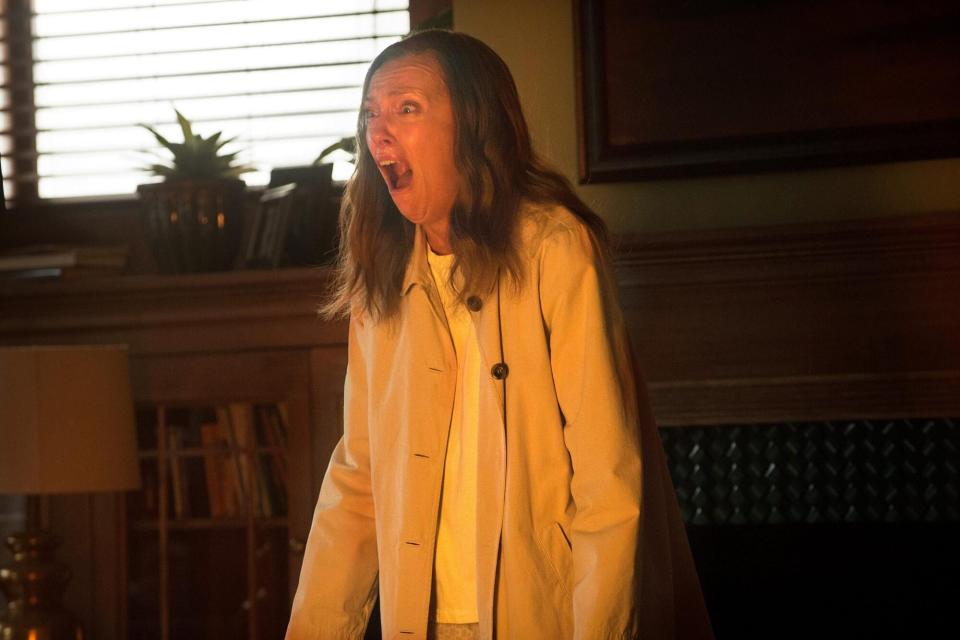
<i>The Innkeepers</i> (2012)
The Innkeepers — Ti West's followup to his '80s-inspired 2009 breakout The House of the Devil — tends to fly under the radar, and it deserves more recognition. The film unfolds in the sad era in which it was released, when the aftereffects of the 2008 financial crisis saw widespread unemployment and beloved local businesses turned into parking lots. Both are represented here: Sara Paxton and Pat Healy star as Claire and Luke, post-grad millennials working for peanuts at a small hotel on the verge of closing. Instead of staring down the uncertainty of their futures, the pair find distraction by searching for ghosts in the building's ancient hallways.
Plenty of spooky stuff happens in The Innkeepers and the film should easily satisfy those in search of a ghost story. Still, there's an ambiguity at its heart that foregrounds the struggles of Claire and Luke, whose investment in what may or may not exist in the spirit realm is fueled by the grim realities waiting for them outside. EW critic Lisa Schwarzbaum praises West's talent for developing characters, calling the lead duo "living, breathing personalities, independent of their relationship with the house ghoul." There are scarier things in this world than spirits, after all.
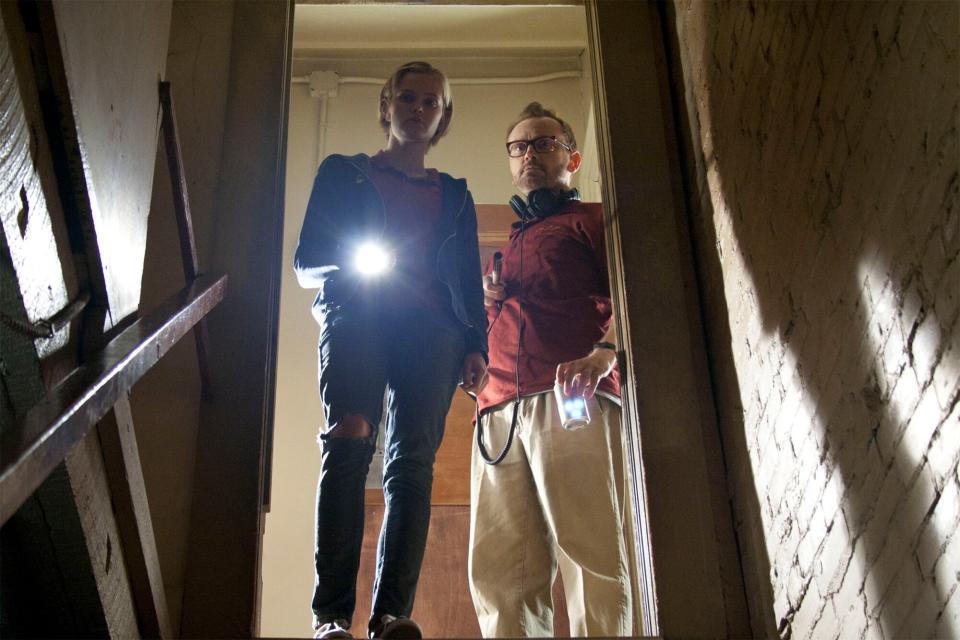
<i>The Invitation</i> (2015)
Karyn Kusama, now one of the industry's more respected directors, was still stinging from the critical and commercial failure of 2009's Jennifer's Body when she released The Invitation six years later. It was an auspicious comeback, moody and melancholy in its story of a grieving Will (Logan Marshall-Green) who attends an emotionally loaded dinner party hosted by his ex-wife Eden (Tammy Blanchard) and her new husband David (Michiel Huisman). It's a familiar setup, the stuff of thirtysomething character studies, but Kusama, working from a rich script by Phil Hay and Matt Manfredi, slowly teases out unnerving surprises that punch the gut before goring it.
Honestly, the final act's hard right into horror is a bit jarring, but only because it's such an empathetic portrait of the disparate ways people process a catastrophic personal tragedy. It's a slow, deliberate watch, but, as EW's Chris Nashawaty notes in his review, it's worth it for the "final shot that's both as chilling and as perfect as anything Twilight Zone impresario Rod Serling dreamed up in his sting-in-the-tail prime."
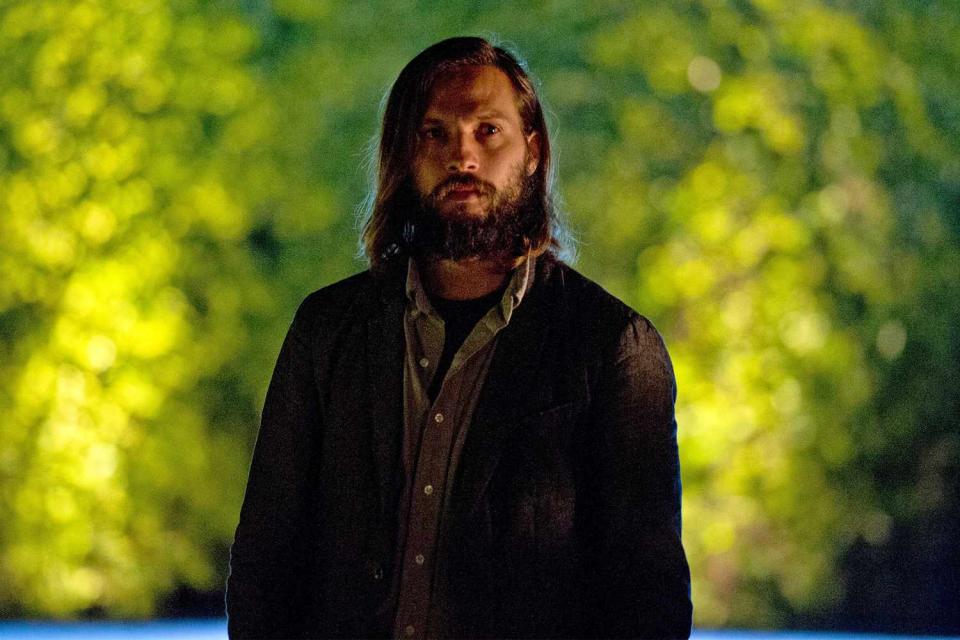
<i>It Follows</i> (2015)
David Robert Mitchell's It Follows is like if The Ring were reimagined as a teen sex PSA, just without the shame. Maika Monroe stars as 19-year-old Jay, who, upon losing her virginity to her boyfriend, learns that he's left her with an STD (sexually transmitted demon) that can only be cured by passing it on to someone else. Until she does, she'll be followed by a shuffling, zombie-like shape-shifter intent on snapping her limbs. "It Follows sets us up for all of the tired teen-body-count-flick tropes," reads EW's review, "and then spends the next hour and a half subverting them with wit, style, and an almost suffocating sense of dread."
Mitchell finds plenty of terror in his humanoid pursuers, but it's his muted, wide-angle shots of the Detroit suburbs and the casual charisma of his leads that linger. That naturalism works to contextualize the themes, too. It Follows isn't anti-sex; it's about the danger, insecurity, and anxiety baked into our earliest intimate encounters, and the ways they inevitably follow us into future relationships.
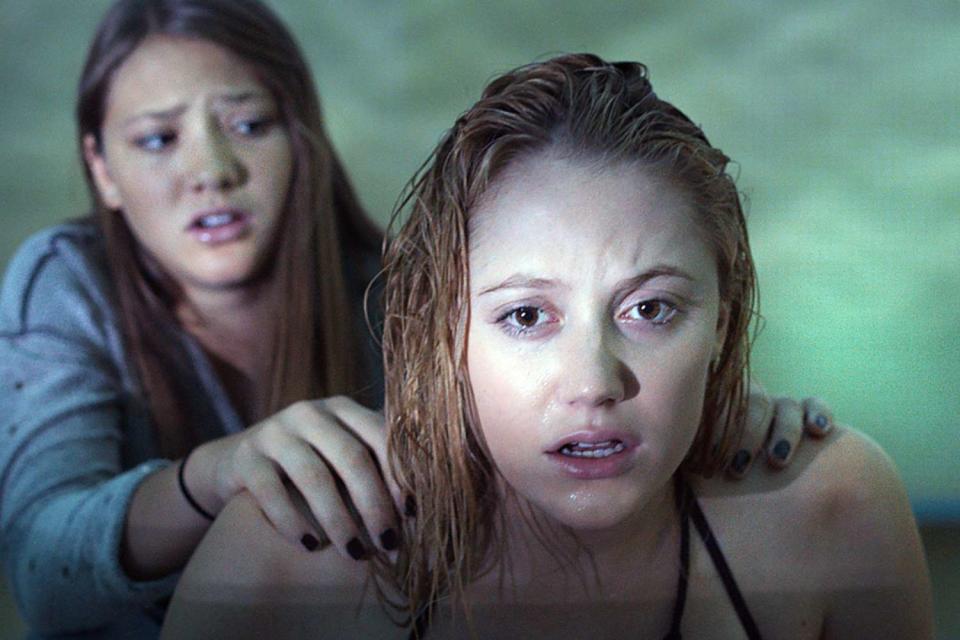
<i>One Cut of the Dead</i> (2017)
You can't say too much about One Cut of the Dead without spoiling everything that makes it such a novel, entertaining film. But just know that it's much more than the zombie gorefest it presents itself as at first. As it evolves, Shin'ichirô Ueda's film, made for roughly $25,000, turns into something you probably never expected to see: a horror riff on Michael Frayn's beloved deconstruction of the farce, Noises Off.
Need a second opinion? Kevin Bacon told EW One Cut of the Dead is his perfect horror movie for Halloween. "You're going to watch the first 45 minutes and say, 'He's out of his mind, this is the worst horror movie I've ever seen in my life,'" Bacon explained. "You really have to stick with it, because it is both funny and scary and a really great and loving homage to the genre in general."
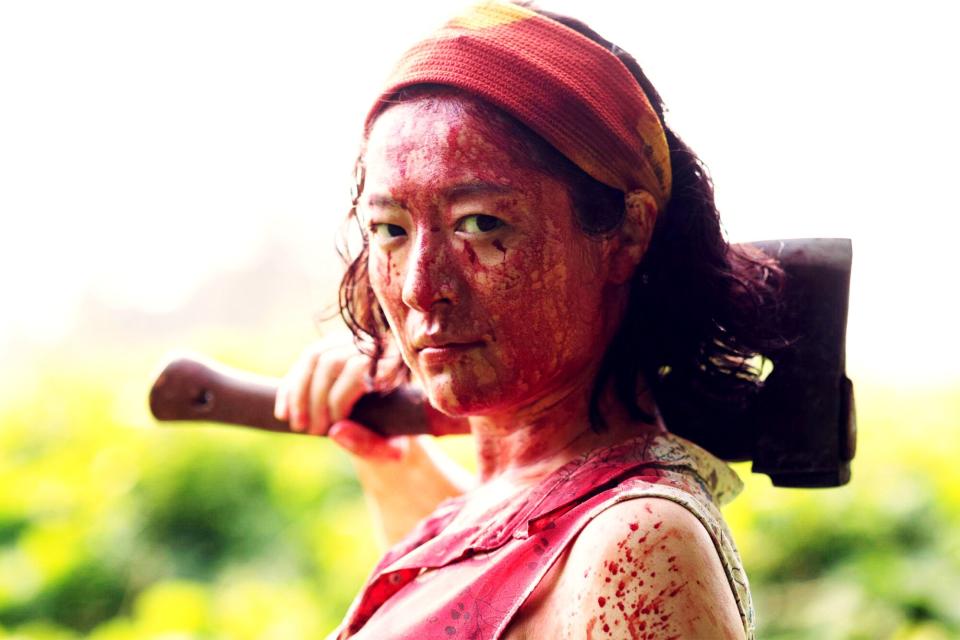
<i>Raw</i> (2016)
Before unleashing 2021's grisly, audacious, and Cannes Palme D'or-winning Titane on audiences, French filmmaker Julia Ducournau established her body horror bonafides with Raw, a coming-of-age feature about a teen vegetarian-turned-cannibal. It's sensational stuff, but, like David Cronenberg before her, Ducournau finds philosophy and pathos in the grotesqueries of the flesh. Raw is most certainly disgusting — it famously caused audience members to faint at the Toronto International Film Festival — but it's also a touching and quietly tragic story about desire, shame, and animality.
"Think of it as Carrie meets Animal House meets Dawn of the Dead, with subtitles," reads EW's stellar review, which goes on to praise the movie for its "audacity and style" and "undeniably wicked punch." Just don't watch it with food.
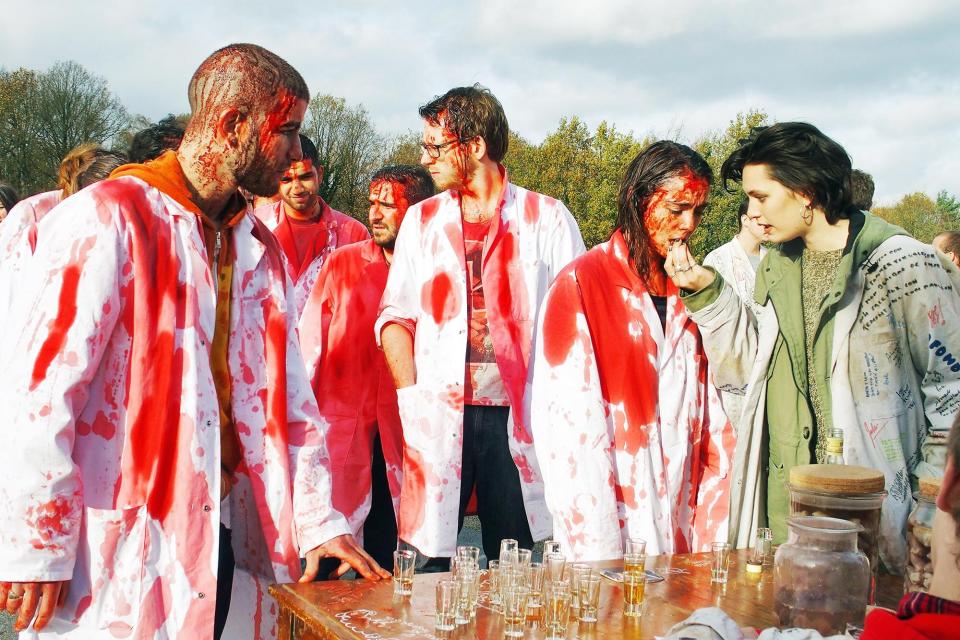
<i>The Skin I Live In</i> (2011)
A mad scientist movie for a modern age, Pedro Almodóvar's The Skin I Live In stars Antonio Banderas, reuniting with the filmmaker for the first time in more than two decades, as a plastic surgeon interested in more than butt lifts and tummy tucks. Banderas' Dr. Ledgard is constructing a new, more resilient type of skin — and he's doing so with a human guinea pig, Vera (Talk To Her's Elena Anaya). Ledgard's backstory is plenty fascinating with its lost lovers and thuggish brothers, but it's Vera's past that sends this film spiraling into horror territory.
The themes are rich, disturbing, and, as EW's Lisa Schwarzbaum notes, "far-reaching" in the ways they use skin as a vessel in which to explore the self, sexuality, and genetics. The aesthetic allusions to Georges Franju's iconic Eyes Without a Face are intentional (just look at the movie poster), and bring to mind the ways in which appearance interweaves with identity.
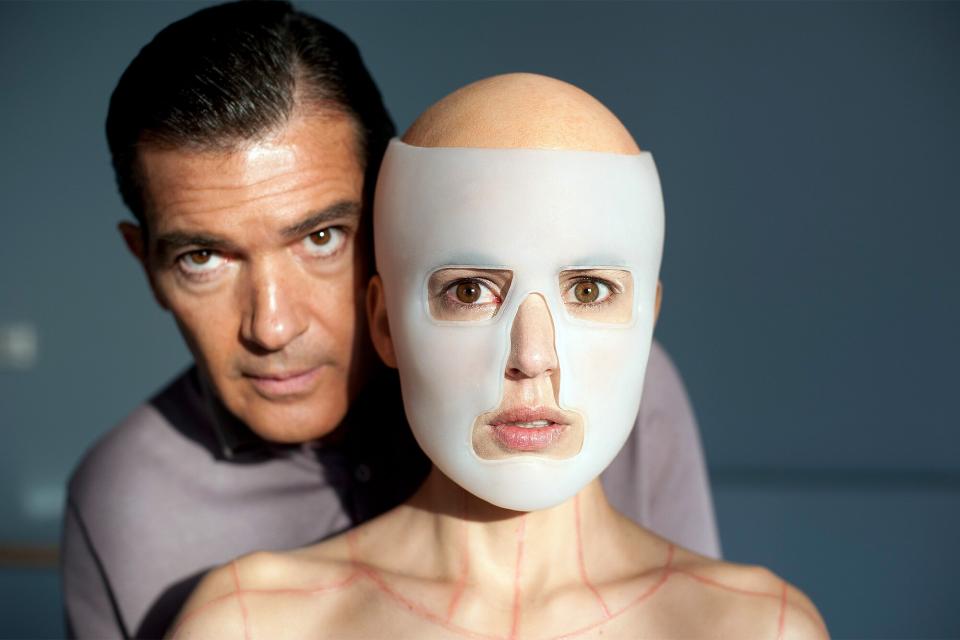
<i>The Witch</i> (2015)
There's something to be said for a horror movie in which the Devil is real — not in an abstract sense, but in a biblical one. Robert Eggers' The Witch gives us that caveat in the form of a nasty goat named Black Phillip, who trots circles around a family of settlers who, after being banished from a Puritan colony in the 1600s, begin a new life near a forest filled with entities not-so-pure. Fear not, this is no morality tale. Rather, it's a film that envisions the world Puritans feared the most, one where magic is both real and more powerful (and alluring) than the savior up above.
Anya Taylor-Joy, in her breakout role, shines in what EW critic Chris Nashawaty dubs "a slice of pilgrim horror" that's "unnervingly moody" and "chillingly creepy." EW's own Clark Collis also goes on to praise Egger, who "imbues the film with a sense of dreadful isolation while also finding true horror in its rapidly disintegrating — and numerically diminishing — family unit." Yep, you may want to watch this one away from loved ones and with a crucifix clutched in your palm…
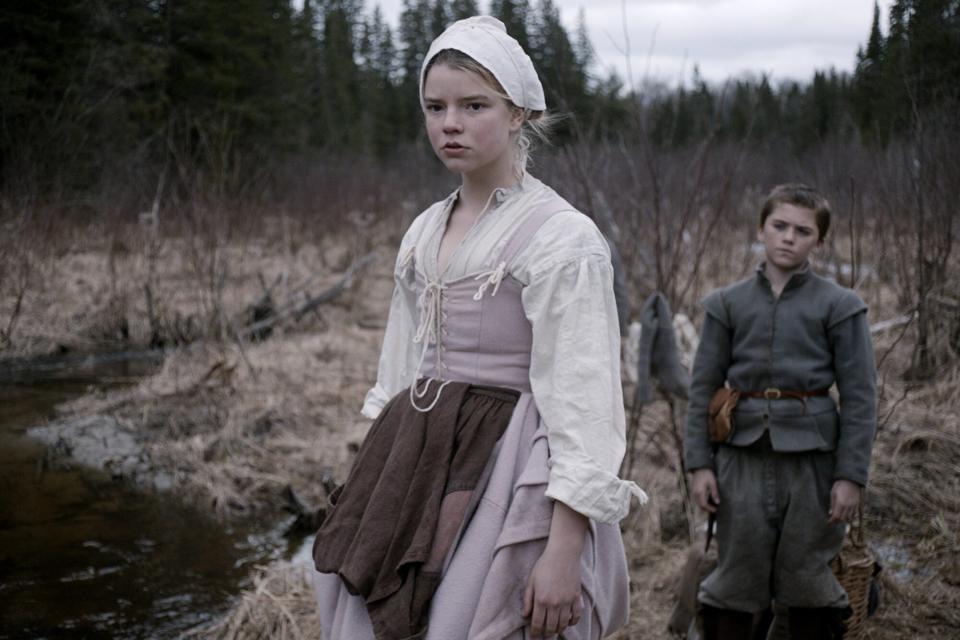
<i>You're Next</i> (2011)
One of the first things film nuts will notice about Adam Wingard's You're Next is that this smirking slasher's cast is filled with directors, from Larry Fessenden (Wendigo) and Amy Seimetz (She Dies Tomorrow) to Joe Swanberg (Drinking Buddies) and Ti West (X). What unites each of their filmographies is a penchant for naturalism, something Wingard also weaves into his non-Kong genre work like the fantastic The Guest. "What's become more and more interesting to a lot of us," Seimetz told EW, "is this new form of horror, or thriller, that's straddling a line between naturalism and pulp." A reaction to the formulaic, teen-heavy slashers of yore, this movement was cheekily dubbed "mumblegore." And You're Next just might be its crowning achievement.
The film follows outsider Erin (Sharni Vinson) as she attends the reunion of a well-to-do, if deeply miserable, Missouri family with her boyfriend Crispian (AJ Bowen). Verbal arrows fly across the dinner table before real ones shatter the windows as a gang of masked butchers infiltrates the estate. "It's like Ordinary People meets Scream," reads EW's review, which goes on to laud it as a "deliciously twisted" experience that will leave viewers feeling as if they've endured a "grueling, giddy workout."
If you enjoyed You're Next, you might also like: Hush (2016), streaming on Netflix.
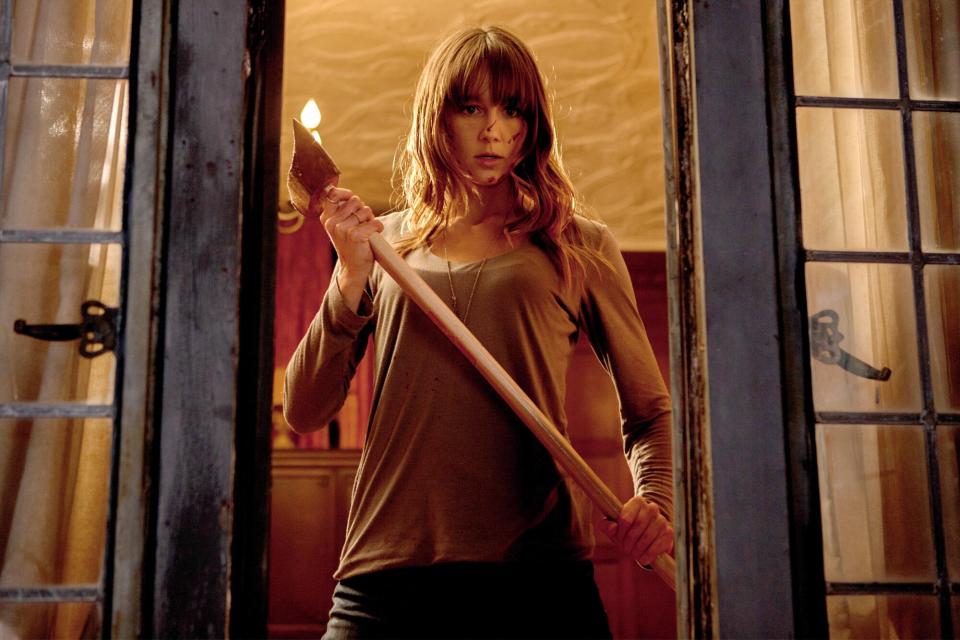
Related content:

